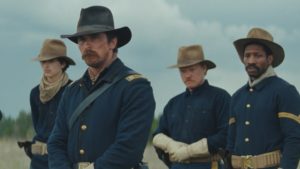Hostiles
Posted on January 18, 2018 at 2:41 pm
B-| Lowest Recommended Age: | Mature High Schooler |
| MPAA Rating: | Rated R for strong violence, and language |
| Profanity: | Some very strong and racist language |
| Alcohol/ Drugs: | Alcohol, smoking |
| Violence/ Scariness: | Extensive and very graphic violence, many characters injured and killed, rapes |
| Diversity Issues: | A theme of the movie |
| Date Released to Theaters: | January 19, 2018 |

Then there were some stories with a little more nuance and some better intentions but pretty much on the side of “civilization” and the more nuanced Native American characters were usually played by actors who were not Native Americans. Westerns went out of vogue in part because of the growing recognition that the stories were too complicated and painful for the “good guys vs. bad guys” cliches of the past. “Hostiles” is a sincere effort from writer/director Scott Cooper at a Western that frankly grapples with the challenge of building a society on the unthinkable carnage and injustice of the past. But there is more formula than drama, with each character specifically designed to represent a place on the spectrum of culpability. With dialogue like “I don’t know what we are going to do with these wretched savages” and “There ain’t enough punishment for his kind” and soldiers with too-symmetrical responses to their own culpability, and unceasing brutality to drive the points home, even the fine acting cannot bring it to life.
Christian Bale plays Captain Joseph Blocker, a man who has witnessed and inflicted horrible brutality in the fight with Indians. When he is ordered to escort an Indian leader and his family to their home, he refuses, until his superior officer threatens to court-martial him and withhold his pension. Blocker despises Chief Yellow Hawk (Wes Studi), who has been in prison for years and is dying of cancer. But the President has ordered that he be allowed to return home to die, and he will need an escort to protect him and his family.
Blocker assembles a group of soldiers and they begin the journey. They come across Rosalie Quaid (Rosamund Pike), whose husband and children have just been killed by Indians, who stole their horses and burned down her home. She is severely traumatized, but Blocker’s respectful treatment helps her begin to accept what has happened, and when Yellow Hawk’s daughter offers her some clothes, she changes out of her blood-stained dress.
Each encounter along the way, most horrifically brutal, is designed to add some variation on the theme, and all boil down to: both white settlers and Native Americans committed atrocities and both have to find some way to reconcile with the past. The film begins with a quote from DH Lawrence: ““The essential American soul is hard, isolate, stoic, and a killer. It has never yet melted.” Perhaps more apt is a quote attributed to Golda Meir, “We can forgive the Arabs for killing our children. We cannot forgive them for forcing us to kill their children.”
Parents should know that this film has extended peril, violence, and rape, with many characters injured and killed, including children and a baby, and many grisly and disturbing images, suicide, racist epithets and comments, and some strong language.
Family discussion: What helped Mrs. Quaid begin to accept her loss? How were Blocker and Wills different? Why did Blocker get on the train?
If you like this, try: “Unforgiven” and “The Searchers”
